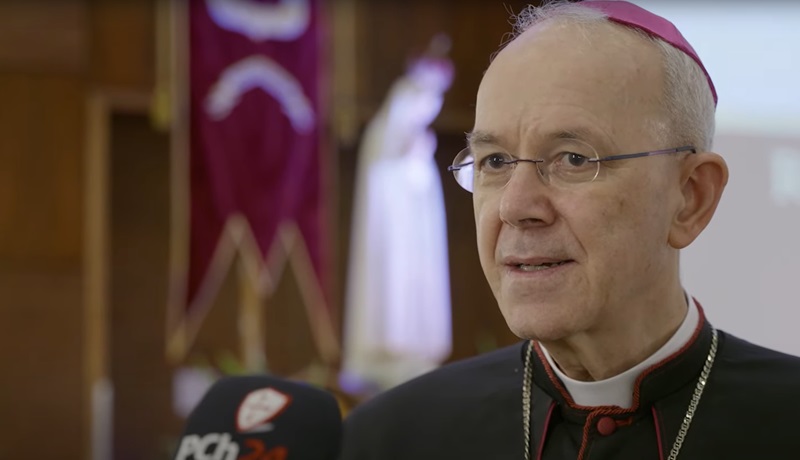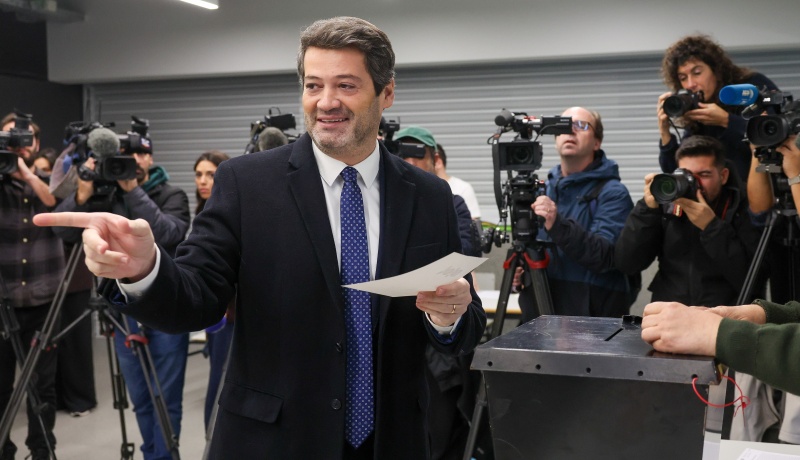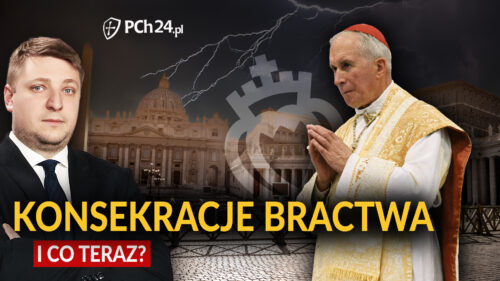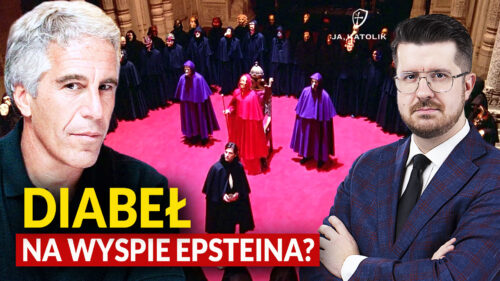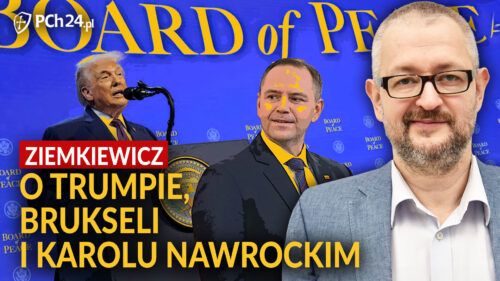During the debate organized by the Father Piotr Skarga Association for Christian Culture and the Pro Ecclesia Universali initiative, Bishop Athanasius Schneider made a very important statement. In this extremely significant testimony, the bishop recalled the traditional teaching of the Church on the responsibility of bishops for the universal Church in the context of the synod on synodality and also gave testimony to the unchanging teaching of the Church in relation to several common errors of our times. We present the full text of the statement delivered on October 14, 2024 in Warsaw.
The responsibility of bishops for the Universal Church in the context of the Synod on synodality
Wesprzyj nas już teraz!
The bishop is a successor of the Apostles and has as his primary task to teach the people in all what Christ has taught and commanded to observe (cf. Mt. 28:20). The name “bishops” derives from the Greek word “episkopos”, which means a watchman, a guard, a custodian. Pope Saint Gregory the Great thus explained the duty of a bishops as a watchman, in referring to the prophet Ezekiel 33:7: “Son of man, I have made you a watchman for the house of Israel. Note that a man whom the Lord sends forth as a preacher is called a watchman. A watchman always stands on a height so that he can see from afar what is coming. Anyone appointed to be a watchman for the people must stand on a height for all his life to help them by his foresight.” (Homily on Ezekiel, I, 11, 4). St. Gregory the Great stressed the obligation of a bishop to preach with courage and fortitude warning his people when they are on the wrong path and need to repent. In his famous work “The Pastoral Rule” St. Gregory the Great wrote about bishops “who hesitate to say openly what is right because they fear losing the favor of men. As the voice of truth (Our Lord Jesus Christ) tells us, such leaders are not zealous pastors who protect their flocks, rather they are like mercenaries who flee by taking refuge in silence when the wolf appears. The Lord reproaches them through the prophet: They are dumb dogs that cannot bark. On another occasion he complains: You did not advance against the foe or set up a wall in front of the house of Israel, so that you might stand fast in battle on the day of the Lord. To advance against the foe involves a bold resistance to the powers of this world in defense of the flock. To stand fast in battle on the day of the Lord means to oppose the wicked enemy out of love for what is right. When a pastor has been afraid to assert what is right, has he not turned his back and fled by remaining silent? Whereas if he intervenes on behalf of the flock, he sets up a wall against the enemy in front of the house of Israel. Therefore, the Lord again says to his unfaithful people: Your prophets saw false and foolish visions and did not point out your wickedness, that you might repent of your sins. (Lam. 2:14). The name of the prophet is sometimes given in the sacred writings to teachers who both declare the present to be fleeting and reveal what is to come. The word of God accuses them of seeing false visions because they are afraid to reproach men for their faults and thereby lull the evildoer with an empty promise of safety. Because they fear reproach, they keep silent and fail to point out the sinner’s wrongdoing.” (Regula Pastoralis, II, 4)
“The Bishop is a man of faith, like Moses who, as Sacred Scripture attests, when leading the people from Egypt towards the promised land, “endured as seeing him who is invisible” (Heb 11:27). The Bishop should evaluate all things, accomplish all things and endure all things in the light of faith. He should read the signs of the times (cf. Mt 16:4) in order to discover what the Holy Spirit is saying to the Churches with regard to eternal salvation (cf. Rev 2:7). He will be able to do this if he nourishes his mind and heart with “the words of faith and good doctrine” (1 Tim 4:6), diligently cultivating his theological knowledge, enriching it with tested doctrines, old and new, always in total harmony with the Roman Pontiff and the Magisterium of the Church in matters of faith and morals.” (Congregation for Bishops, Directory for the pastoral ministry of bishops Apostolorum Successores, 39)
The Bishops is “bound to show due solicitude for the whole Church; even if this does not involve the power of jurisdiction over individuals, it redounds to the advantage of the whole People of God. For this reason, the Bishop has the duty of “fostering and safeguarding the unity of the faith and of upholding the discipline which is common to the whole Church” (Second Vatican Council, Dogmatic Constitution on the Church Lumen Gentium, 23). He should contribute to the ordinary Magisterium of the Church and to the proper application of universal canonical discipline, he should educate his flock in a love for the universal Church, and he should work with them to further every aspect of the Church’s common apostolate. The Bishop should never forget the pastoral principle by which, in governing his own particular Church well, he contributes to the welfare of the whole People of God, which is a corporate body of Churches.” (Congregation for Bishops, Directory for the pastoral ministry of bishops Apostolorum Successores, 13).
When bishops are silent in the face of the storm in which the Church is put, then they abandon the Church, as St Boniface spoke in one of his letters: “If it is dangerous to be negligent in steering a ship in the midst of the sea, how much more perilous to abandon it in a storm with the waves running high; and even so the Church which makes its way through the ocean of this world like a great ship, buffeted in this life by diverse waves of temptation, is yet not to be abandoned but to be controlled. As examples we have the early fathers Clement and Cornelius and many other (popes) in Rome, Cyprian in Carthage, Athanasius in Alexandria, who, under pagan emperors, guided the ship of Christ — nay, his dearest spouse, the Church — teaching, defending, laboring, and suffering even unto the shedding of blood. Of myself I can surely say in the words of the Song of Songs: “They set me as a watchman in the vineyards, and my own vineyard I have not kept.” For the vineyard, according to Nahum, the prophet of the Lord of Sabaoth, is the House of Israel, now the Church Catholic. … It is time to speak freely. … The teacher and guide who hides the sins of the people in silence becomes thereby guilty of the blood of lost souls.” (Letter 62 to Cuthbert of Canterbury)
Every bishop should make as a rule of his life and ministry the episcopal motto of Blessed Cardinal Clemens von Galen: “Nec laudibus, nec timore” (a formula of the rite of episcopal consecration), that is to say: Neither praise nor threats will hinder me to fulfill my duty.” Blessed Cardinal Clemens von Galen was called the “Lion of Muenster”. It was neither innate courage nor excessive temerity, but only a deep sense of responsibility and a clear vision of what was right and what was wrong that could have induced Bishop Clemens August to speak without fear. Shortly before his death in March 1946, Cardinal von Galen said: „The good Lord gave me a position that obliged me to call what was black, black, and what was white, white, as outlined in episcopal ordination”.
During the 4th century, when the greatest part of the episcopate was infected with the Arian heresy, a heresy denying the Divinity of Jesus Christ, there were hold continuously synods, the effect of which was a further doctrinal confusion. In that time St. Gregory of Nazianzen wrote: “As for me, if I must write the truth, I flee all gatherings of bishops, because I have never seen a synod come to a good end, nor bring evils to a close rather than augmenting them” (Letter 130.1).
The main goal of a synod is to expose and protect the purity of the Catholic Faith and the Church’s constant discipline, in avoiding any possible ambiguity and thus not leaving any room for doubts.
All heretics and enemies of the perennial Catholic doctrinal and liturgical tradition use as their tool the rhetoric of tricks. They “covered up the snares of their cunning under fraudulent turns of phrase, so that the error, hidden between sense and sense, insinuates itself more easily into minds. Pope Pius VI condemned in 1794 such a cunning and ambiguous method of the fake Synod of Pistoia, affirming: “If this convoluted and fallacious way of debating is vicious in any oratorical manifestation, in no way is it to be practiced in a Synod, whose first merit must consist in adopting in teaching an expression so clear and limpid that it leaves no space to the danger of conflicts. … Against these snares, unfortunately renewed in every age, no better way was put in place than that of exposing the sentences which, under the veil of ambiguity, envelop a dangerous discrepancy of meanings, signaling the perverse meaning of the error that the Catholic Doctrine condemns.” (Bull Auctorem Fidei).
A witness to the immutable teaching of the Church regarding several widespread errors of our day:
Considering that widespread doctrinal confusion is now causing great spiritual harm to the faithful, and that further silence would be a grave omission of the solemn promise made at episcopal ordination to defend the integrity of the Catholic Faith, a Catholic Bishop must feel it is his pressing duty to present a public witness to the immutable teaching of the Church, as an act of fraternal assistance to the teaching office of the Supreme Pontiff, and as an expression of sincere love for the Church and the salvation of souls.
- The Church must not be pushed or coerced, based on cultural or supposed anthropological changes, to teach the opposite of what she has always taught regarding essential questions for our salvation, such as the confession of faith, subjective conditions for access to the sacraments, and the observance of the moral law.
Therefore, it is not possible for the Church today to teach doctrines contrary to those she has previously taught in matters of faith and morals, whether by the Pope ex cathedra, or in the definitions of an Ecumenical Council, or in the ordinary universal magisterium of the bishops dispersed throughout the world (cf. Lumen Gentium 25).
- There can be no confusion between marriage and other types of unions of a sexual nature. The suggestion that the Church could bless same-sex couples is now creating considerable confusion, both by making these unions seem analogous to marriage, and by presenting homosexual acts as a good, or at least as the possible good that God asks of people in their journey toward Him.
Therefore, any rite or blessing of same-sex couples should be prohibited, for it would give rise to such confusion. It is inadmissible that in certain circumstances a pastor could bless unions between homosexual persons, suggesting thereby that homosexual behaviour is not contrary to God’s law and the person’s journey towards God.
- The universal ordinary Magisterium has always taught that every sexual act outside of marriage, and in particular homosexual acts, constitute an objectively grave sin against God’s law, regardless of the circumstances in which it occurs and the intention with which it is carried out.
Therefore, the teaching upheld by the universal ordinary Magisterium, that every sexual act outside of marriage, and in particular homosexual acts, constitute an objectively grave sin, cannot be changed, and continues to hold true.
- The inspiration of the Holy Spirit extends only to God’s word in Holy Scripture and Sacred Tradition.
Therefore, the processes or results of a synodal assembly, or other statements of the Church’s hierarchy, cannot be attributed to the “inspiration of the Holy Spirit”.
- The Lord promised infallible assistance to Peter and his successors only in the supreme teaching office, i.e., when a Pope, by a definitive act, proclaims a doctrine pertaining to faith and morals, which extends as far as the deposit of divine Revelation itself.
Therefore, the Pope does not enjoy infallible assistance in his governing office.
- The Bishops are vicars and ambassadors of Christ, and govern the particular churches entrusted to them by their authority and sacred power (cf. Lumen Gentium 27).
Therefore, the idea of a so-called synodal structure, composed by bishops, priest and laypeople, which would be the supreme governing body of the universal church or a diocese, to which the pope and the bishops would be subject, is contrary to the Divine constitution of the Church and to the entire tradition of the Church.
- The exclusive reservation of the sacrament of priestly ordination to baptized males has been taught infallibly by the ordinary and universal Magisterium. (cf. Pope John Paul II Apostolic Letter Ordinatio Sacerdotalis) A response of the Congregation for the Doctrine of the Faith to a dubium raised about this Apostolic Letter, and approved by John Paul II, affirmed that this doctrine belongs to the deposit of faith.
Therefore, the Church does not, now or in the future, have the faculty to confer priestly ordination on women. For this would contradict the truth that the exclusive reservation of this sacrament to baptized males belongs to the very substance of the Sacrament of Holy Orders, which the Church cannot change.
- The sacrament of holy orders is one sacrament, conferred in three grades. “The divinely established hierarchy is made up of bishops, priests, and ministers,” (Council of Trent, Session 23, Doctrine on the Sacrament of Holy Orders, can. 6) i.e., at least also of deacons. The sacramental ordination of women as deacons would therefore contradict the whole Tradition of the universal Church, both Eastern and Western, and violate her God-given hierarchical constitution.
Therefore, the Church does not have the faculty to confer the sacrament of Holy Orders in its grade of the deaconate on women or declare any non-sacramental ecclesiastical office (such as the historical “deaconess”) to be part of the tripartite sacrament of holy orders.
- According to the teaching of the Council of Trent, the validity of sacramental absolution requires the sinner’s repentance, which includes the resolve not to sin again. God’s mercy is so great that we can convert to Him, confess our guilt, and live as He has taught. Merely approaching the sacrament of confession is not a sufficient condition for receiving absolution, unless it includes the confession of one’s sins, repentance, and a firm purpose of amendment.
Therefore, a penitent who, while admitting a sin, refuses to resolve not to commit it again, cannot validly receive sacramental absolution.
May all shepherds of the Church be guided by the following admonition of Pope St. Paul VI:
“The effort to transmit to Christians, not doubts and uncertainties, but certainties that are solid because they are anchored in the Word of God, is a sign of love. The faithful need these certainties for their Christian life; they have a right to them.” (Pope Paul VI, Apostolic Exhortation Evangelii Nuntiandi, 79)

